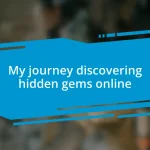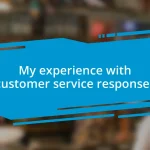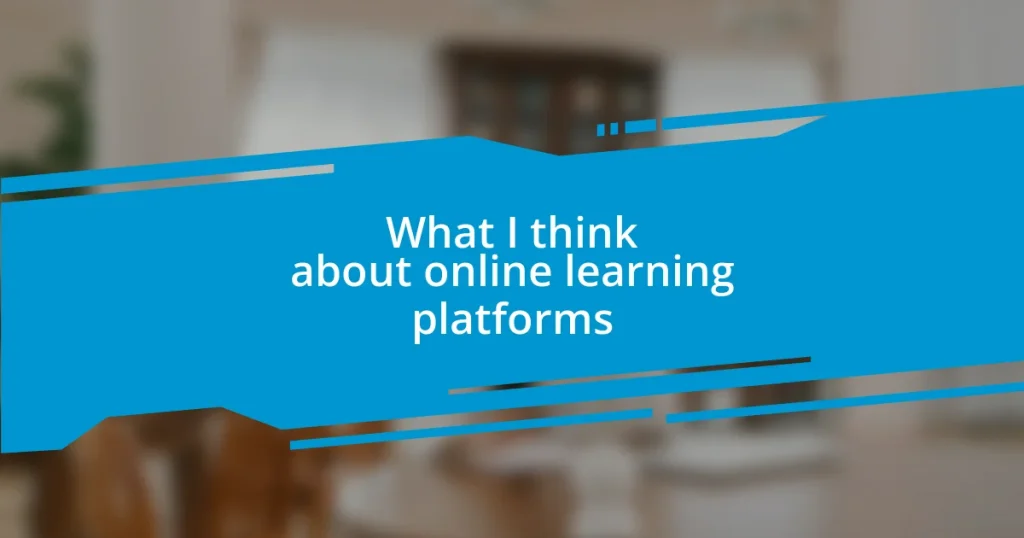Key takeaways:
- Online learning platforms offer unprecedented convenience, enabling learners to access a diverse range of courses anytime, anywhere, often at a lower cost compared to traditional education.
- Key features of effective online platforms include user-friendly interfaces, interactive content, and strong community support, which enhance the overall learning experience.
- The future of online education is poised for growth with trends like personalized learning experiences through AI, immersive technologies such as VR and AR, and collaborations between educational institutions and tech companies.
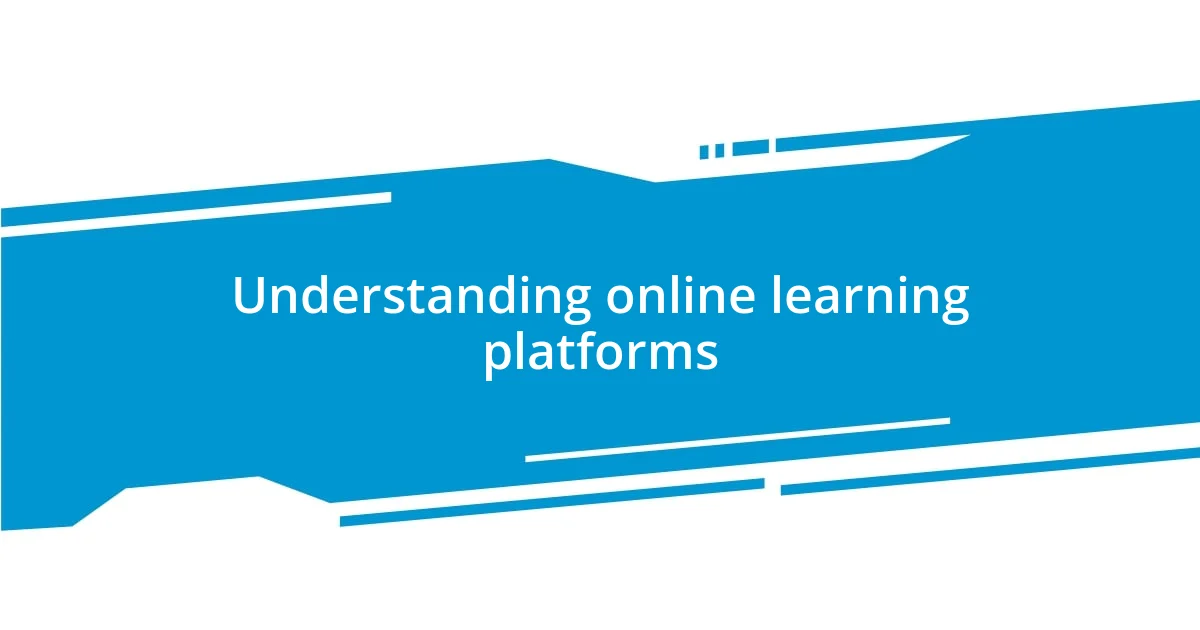
Understanding online learning platforms
Online learning platforms have revolutionized the way we access education. I remember the first time I stumbled upon one; it felt like opening a door to a world of knowledge. Suddenly, courses from top universities and industry leaders were just a click away. Isn’t it fascinating how technology has made it possible for anyone, anywhere, to learn something new?
What strikes me most about these platforms is the incredible diversity they offer. From coding to cooking, there seems to be something for everyone. I once enrolled in a graphic design class purely out of curiosity and found it not only enlightening but also deeply fulfilling. It makes me wonder—how many hidden talents could we discover just by exploring the courses available online?
Additionally, the flexibility that online learning provides can be a double-edged sword. While it allows for learning at our own pace, it also requires a level of self-discipline that I sometimes struggle with. Has anyone else found themselves procrastinating on a course with no deadlines? I can certainly relate! Balancing the freedom of online learning with personal motivation is a challenge that many of us face.
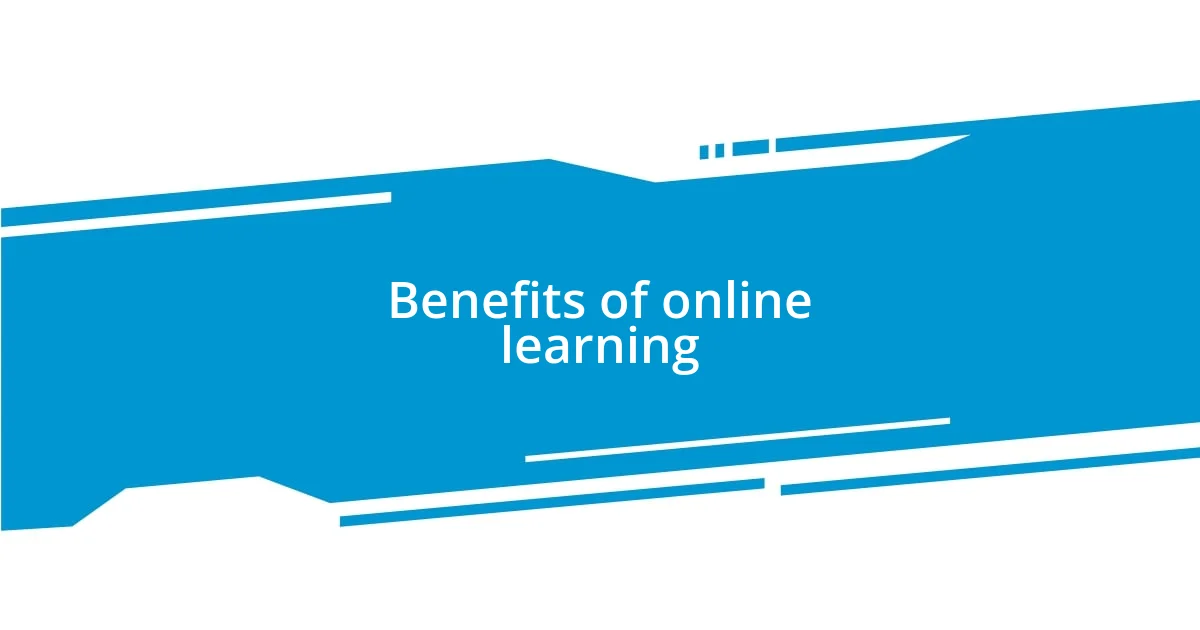
Benefits of online learning
Online learning platforms offer remarkable convenience that can truly enhance our educational journeys. One of the most significant benefits I’ve experienced is the ability to learn anytime, anywhere. I recall sitting in a coffee shop on a rainy afternoon, earbuds in and completely immersed in a data analysis course. That freedom to structure my learning around my lifestyle has been a game-changer for me.
Another notable advantage is the cost-effectiveness of many online courses. In my experience, I’ve saved a considerable amount compared to traditional education. For instance, I once taking a marketing course that was only a fraction of the cost of a similar in-person program. Plus, many platforms offer scholarships or free trials, making quality education accessible to all. Isn’t it amazing that financial barriers can be reduced in such a significant way?
I also appreciate the opportunity for personalized learning paths. Every learner is unique, and I often found myself lost in the pace of a conventional classroom. With online platforms, I can fast-track through familiar concepts and slow down when diving into more complex topics. Adjusting my learning speed makes the process not just effective but also enjoyable. It’s like having my own tailored education plan!
| Benefit | Personal Experience |
|---|---|
| Convenience | Learn anytime, anywhere—I was thrilled to take a course at my favorite coffee shop. |
| Cost-effectiveness | Saved money by enrolling in an online marketing course that was much cheaper than its in-person counterpart. |
| Personalized learning paths | Being able to adjust my learning speed meant I could enjoy diving into complex topics without getting lost. |
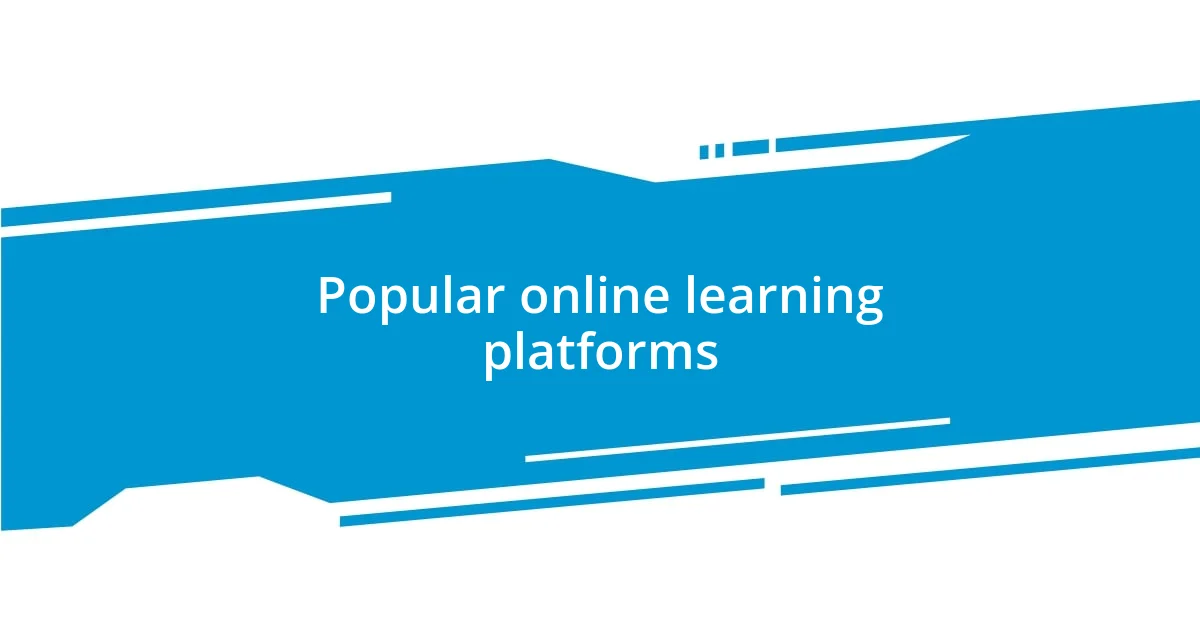
Popular online learning platforms
When it comes to popular online learning platforms, a few names regularly come to mind. I’ve personally explored several, and they each have their unique offerings. For example, platforms like Coursera and edX partner with universities to provide accredited courses, while sites like Udemy are known for their vast range of topics taught by industry professionals. Honestly, I was pleasantly surprised by the depth of knowledge available on platforms like Skillshare, where I took a creative writing class that reignited my passion for storytelling.
Here are some of the most well-known online learning platforms:
- Coursera: Offers courses and degrees from top universities and organizations.
- edX: Similar to Coursera, it provides a wide range of courses from respected institutions.
- Udemy: Features a diverse catalog of courses ranging from technology to personal development, created by independent instructors.
- Skillshare: Focuses on creative fields, encouraging hands-on projects and community interaction.
- Khan Academy: A non-profit offering free courses in various subjects, mainly for students at the elementary and high school levels.
Reflecting on my experiences, each platform allowed me to dive into topics I had not considered before. I remember feeling both nervous and excited when I signed up for a data science course on Coursera. The platform’s structure, combining video lectures and quizzes, helped ease my apprehension. It felt like embarking on a new adventure every time I logged in. And as I interacted with fellow learners, I couldn’t help but appreciate the supportive community that transcends geographical barriers.
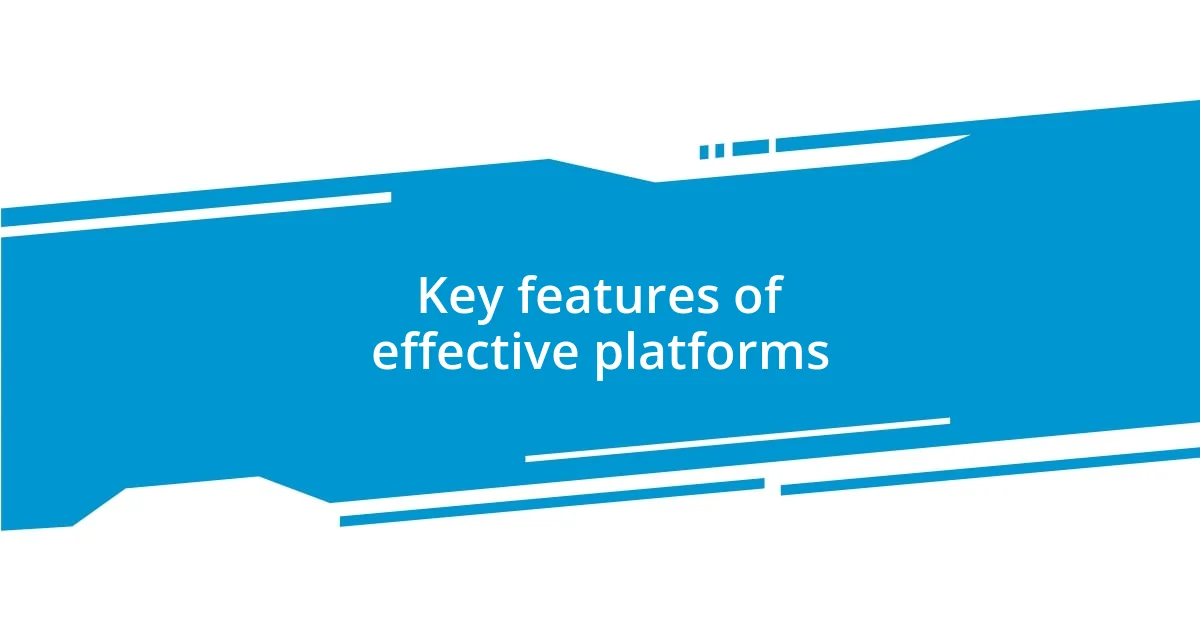
Key features of effective platforms
Effective online learning platforms should prioritize user-friendly interfaces. I remember my first time navigating a complicated system—it felt overwhelming! When a platform is intuitive, it streamlines the experience, allowing learners to focus on content rather than how to use the platform. Isn’t it reassuring when you can easily find your way through courses with just a few clicks?
Another vital feature is interactive content. I find that platforms offering integrated quizzes, discussions, and multimedia make the learning experience more engaging. For instance, in one course, I particularly enjoyed the interactive simulations that brought complex theories to life. It really transformed how I absorbed the material—like stepping into the shoes of a data analyst rather than just reading about it.
Lastly, robust support and community interactions can truly elevate an online learning experience. In my journey, I’ve often felt a longing for connection. Platforms that facilitate discussions, group projects, or even one-on-one support helped bridge that gap for me. I vividly recall a group project in an online leadership course; collaborating with peers from different backgrounds sparked inspiration and challenged my viewpoints. Isn’t it amazing how a virtual community can foster meaningful relationships?
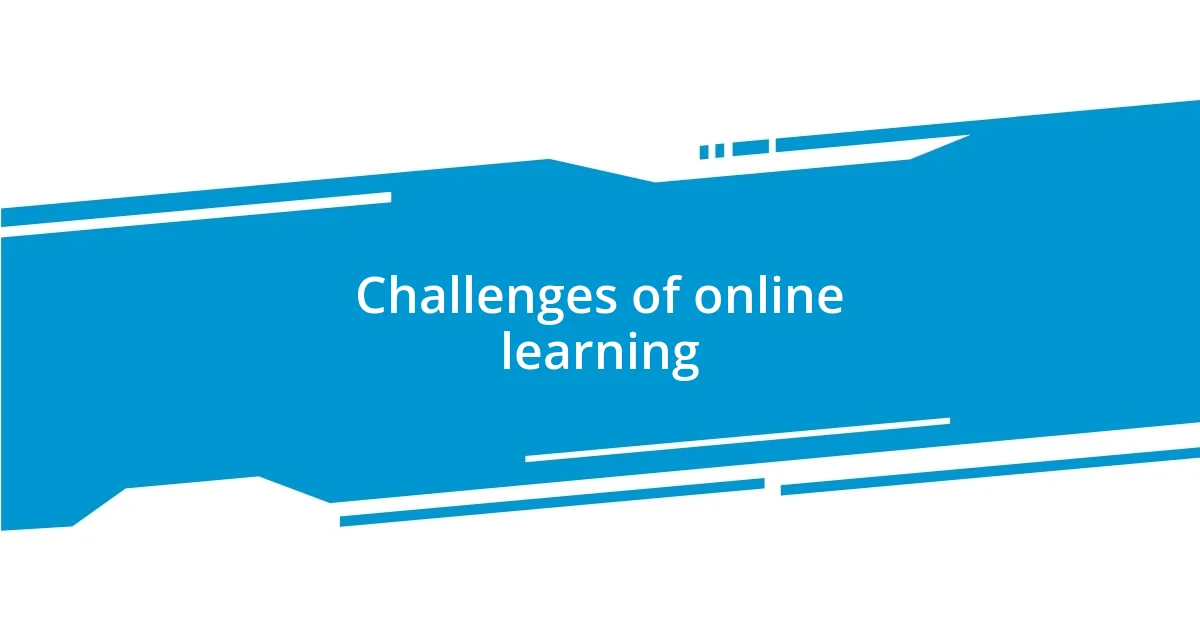
Challenges of online learning
Online learning certainly has its hurdles, and one of the most daunting is the lack of hands-on interaction. I distinctly remember feeling isolated during a course focused on web development. While the online tutorials were informative, I missed the spontaneous exchanges that happen during in-person classes, like quickly asking a peer for help or brainstorming ideas together. Isn’t it interesting how much we rely on those informal moments for clarity and inspiration?
Another challenge is the ever-present threat of distractions in a home environment. I’ve experienced those days when I confidently sit at my desk, determined to concentrate, but then my phone buzzes, or the allure of Netflix calls out. It’s so easy to lose focus. I often wonder—how do others manage to keep their attention on the task at hand? Personally, I started setting specific times for study that allowed me to create a ritual, minimizing distractions and enhancing my commitment to learning.
Time management plays a critical role, too. Juggling work, family obligations, and online classes can feel overwhelming. I once took on a particularly demanding course while working full-time, and I felt like I was constantly racing against the clock. There were nights I stayed up late trying to finish assignments, questioning whether I had made the right choice. Have you ever found yourself in a similar boat? I learned that planning out my week and setting small goals led to a better experience, but that initial struggle definitely highlighted the need for strong time management skills in online learning.
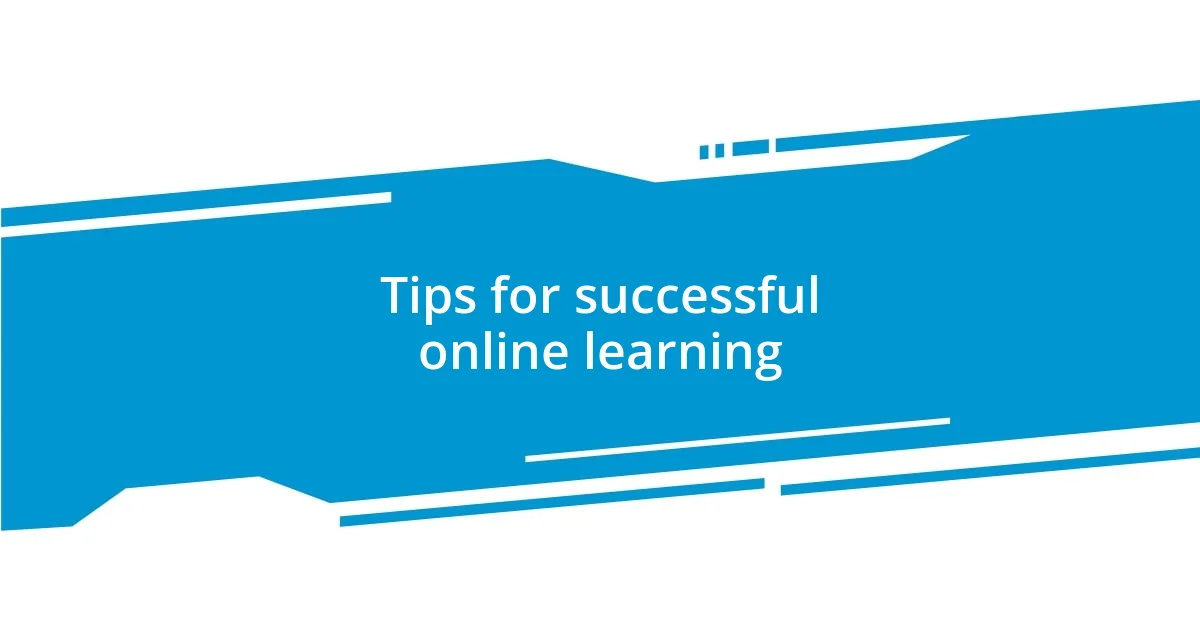
Tips for successful online learning
One key to successful online learning is establishing a dedicated study environment. I still recall setting up a cozy corner in my living room, free from distractions—that made all the difference. When you create a space that signals “study time,” it helps cultivate focus and signals to your brain that it’s time to switch gears. Have you tried modifying your study area to enhance your learning experience?
Another important aspect is staying organized. I remember my first online course, where I was overwhelmed by deadlines and resources scattered everywhere. Incorporating a simple planner or digital task manager can transform chaos into clarity. Is there anything more satisfying than checking items off a to-do list? I’ve found that breaking down assignments into manageable chunks makes them less daunting and more achievable.
Lastly, actively engaging with the material is crucial. I used to passively watch lectures, but it wasn’t until I started taking notes and discussing concepts within online forums that everything clicked. When you immerse yourself in the subject, it no longer feels like just another task—it becomes an integral part of your understanding. Have you explored ways to deepen your engagement with coursework?
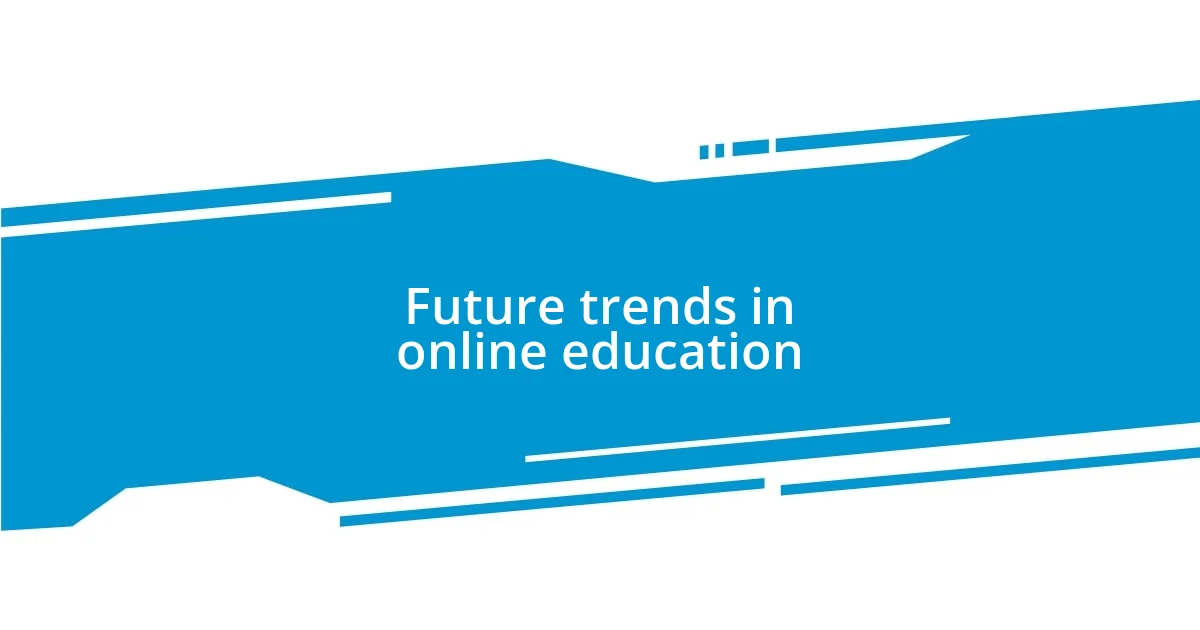
Future trends in online education
One of the most fascinating trends I see shaping the future of online education is the rise of personalized learning experiences. Back when I was exploring different platforms, I noticed that some offered tailored content based on individual performance and learning styles. Isn’t it exciting to think that we might soon have artificial intelligence analyzing our progress and suggesting the most effective resources for us? This kind of customization could make learning feel more relevant and engaging than ever before.
Additionally, I can’t overlook the potential of immersive technologies like virtual reality (VR) and augmented reality (AR) in online education. I remember once trying a VR module for anatomy study—it felt like I was really inside the human body! This sort of engagement completely transformed how I absorbed the material. Imagine what’s possible when VR and AR become mainstream in online classrooms. It could redefine the ways we interact with content and fellow learners, making education more dynamic.
Lastly, I believe we’ll see increased collaboration between educational institutions and tech companies. When I think about my past experiences with different platforms, it’s clear that the best courses often combine strong academic frameworks with cutting-edge technology. How will partnerships shape future learning models? I’m eager to see how this blend can leverage innovative tools to enhance accessibility and quality, allowing more people to benefit from an expansive range of educational opportunities.






